As our train rolled towards Baku, we started to get an uneasy feeling about this place. The first notable thing was the oil drilling rigs that started appearing all around us as we got closer to the Caspian coast. Everything in this region has been revolving around oil for the last 150 years; in 1905 it was producing half of the world’s petroleum, and now that a pipeline from here through Georgia into Turkey has been completed, skipping politically complicated Russia and Iran, Baku is getting rich meteorically fast. In older times most of the extraction was performed from shallow wells using small rigs, which are all still standing, some even still pumping; these days the major efforts are focused on off-shore drillings. Of course oil extraction is not a particularly pretty business, and the scars it leaves nobody really bothers to tend to. The forests of old rusting derricks create an almost post-apocalyptic landscape that was not easy to digest, especially as the first thing to see from the compartment window after waking up in the morning.
Our provodnitsa (carriage attendant) walked through the carriage, collecting the bed sheets, and asked us whether we had any garbage. We had been putting ours in a small bag so we gave it to her. She took it, nonchalantly chucked it out of the window, and went on to the next compartment.
After arriving and checking into our hostel we went out to explore Baku. The city center makes an extraordinary impression. Love it or hate it, Baku is bathing in money. The streets are sparkling clean; the buildings all new or renovated, and generously floodlit at night. Ridiculously expensive cars are cruising the streets, stopping by Dolce & Gabana and Emporio Armani stores, signaling loudly at the occasional Lada to get out of the way. Parks with elaborate fountains, promenades with flowers and trees imported from Australia — excess is the name of the game here. Unfortunately a century of oil exploration has hopelessly polluted the bay of Baku. But what can you expect from a city in which the main avenue by the sea is called Neftciler (Oil Workers) Avenue, and one of the main squares Azneft Square? At least Baku makes no bones about what really is the blood in its veins.
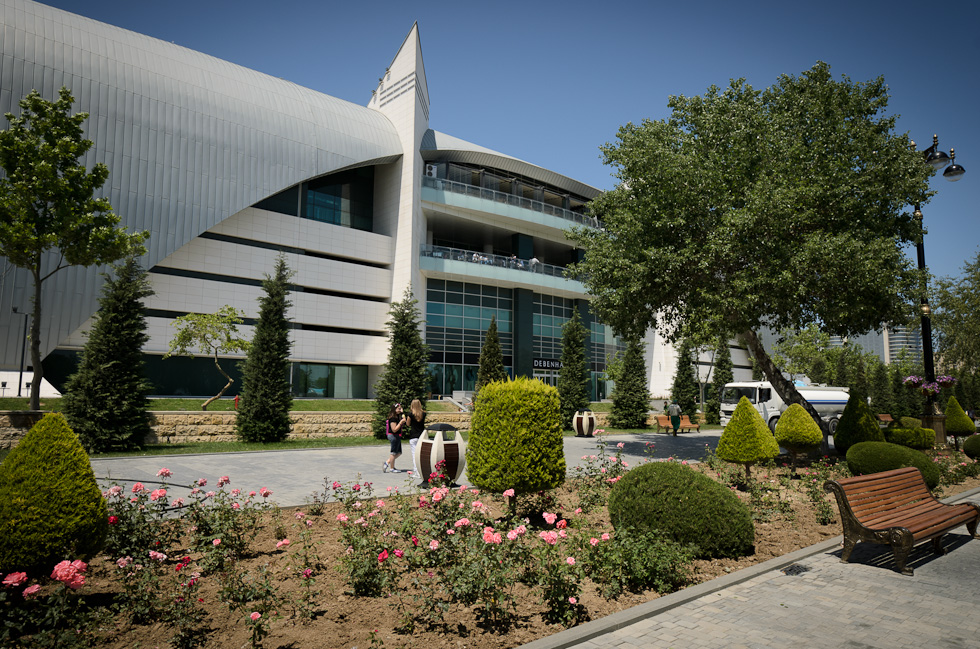
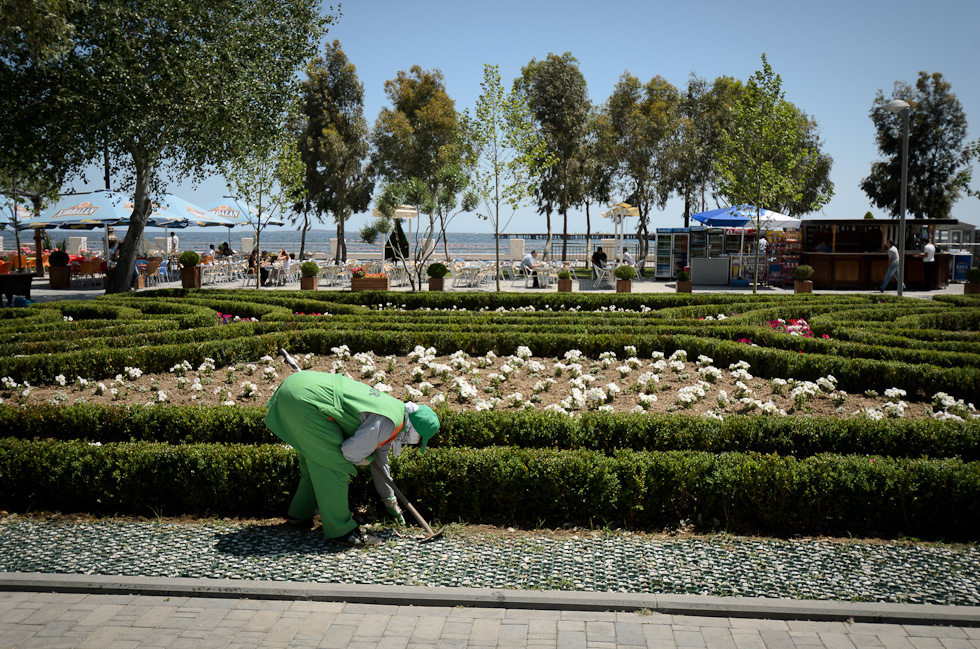
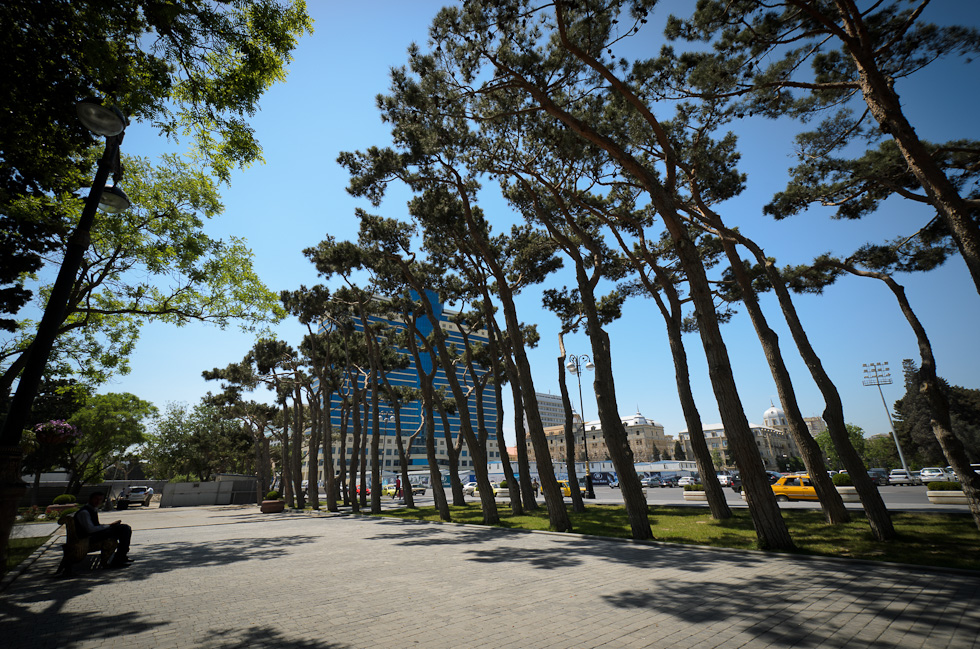
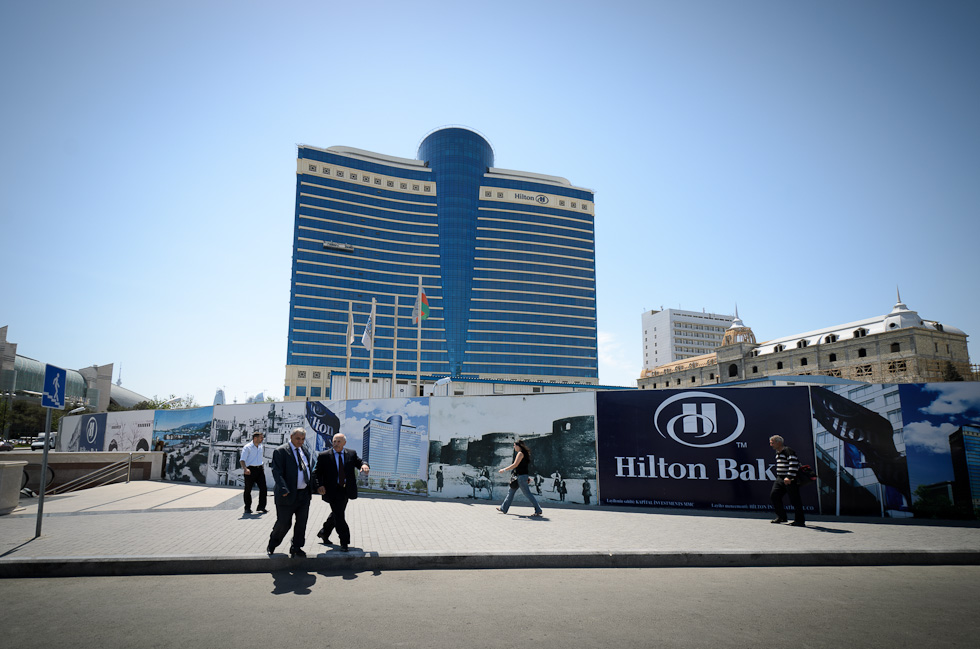
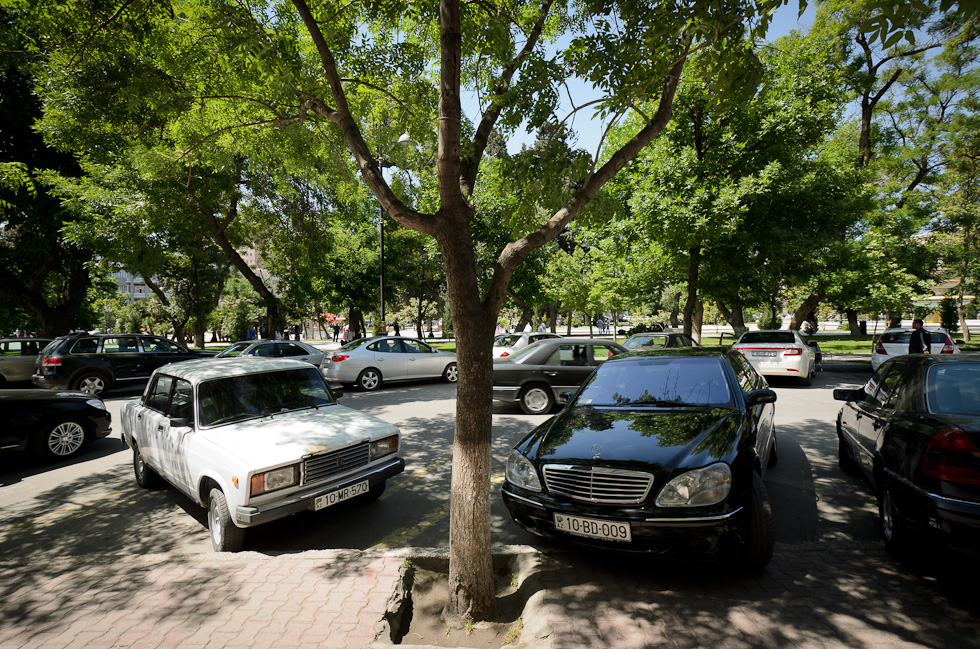
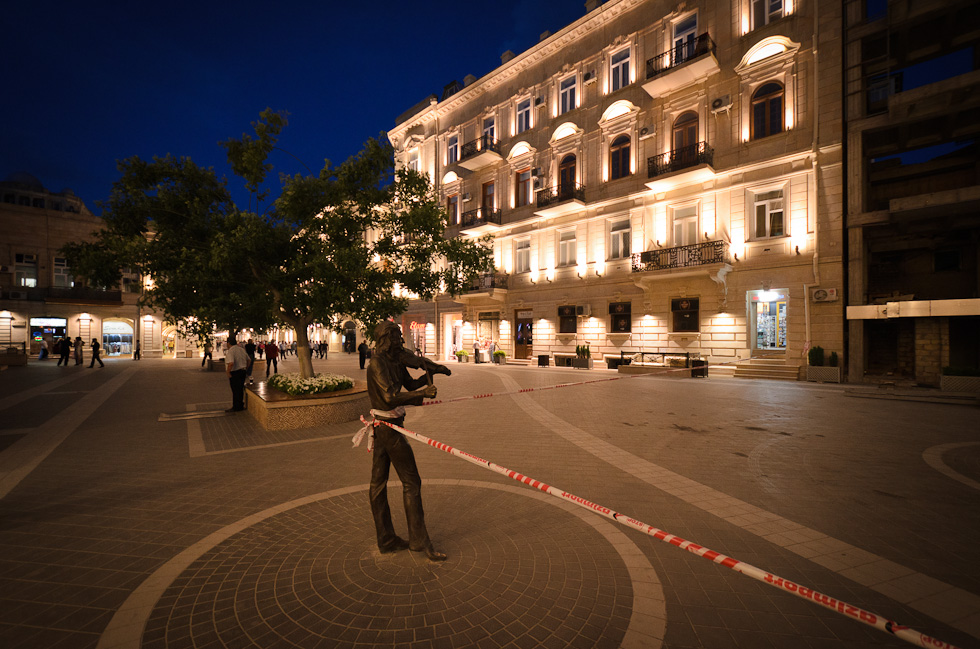
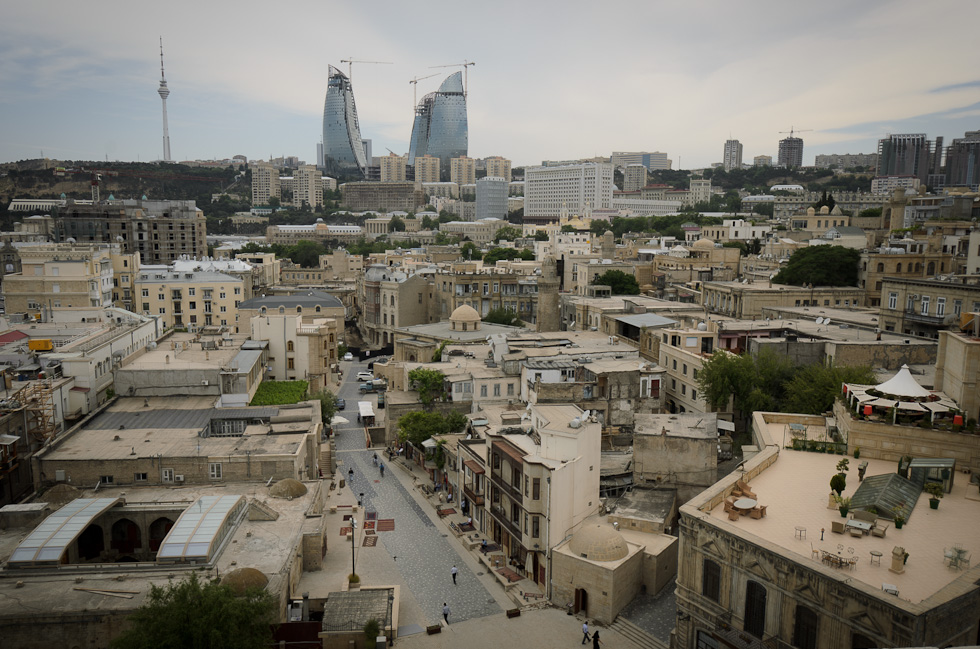
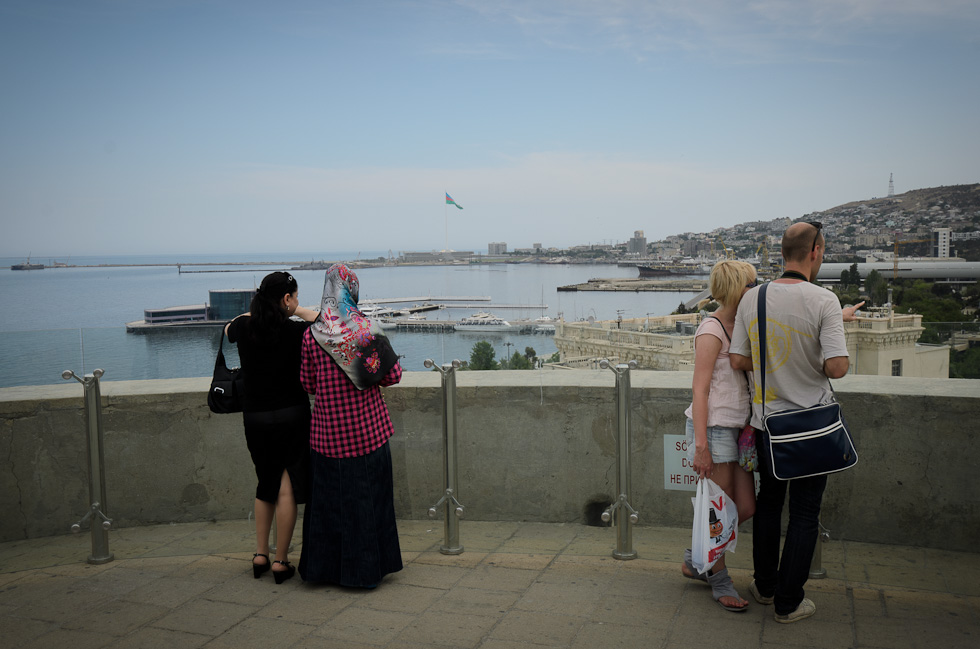
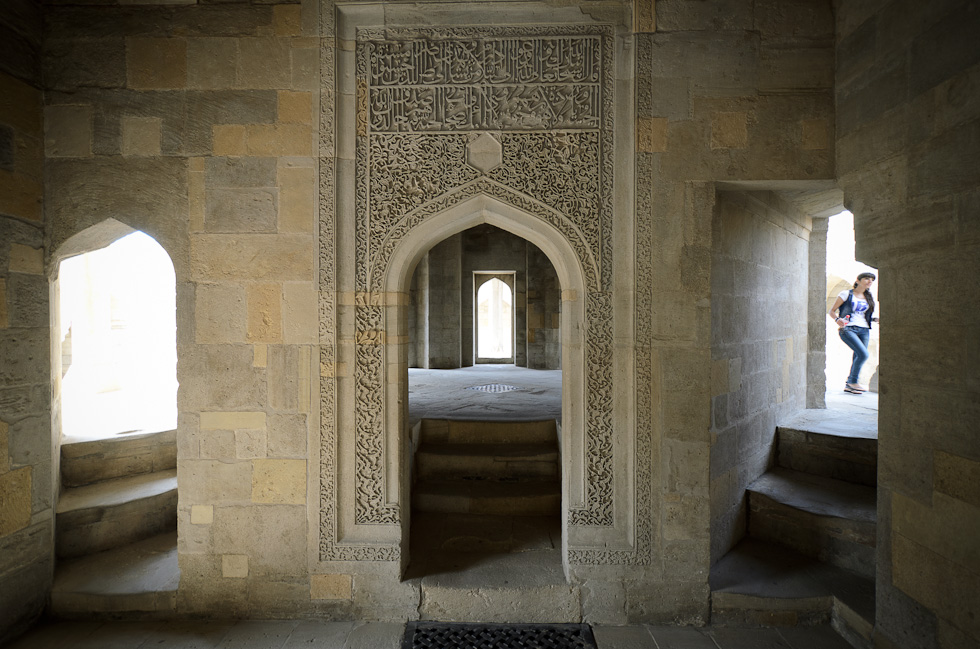
We stayed in a hostel inside the so-called old city, which is anything but old — the narrow streets hint at the way it used to look, but most of the buildings here are new. Azerbaijan in general, and Baku in particular, are not prime destinations for travelers, and people come here for various reasons besides sightseeing. Many, like us, are transiting to Central Asia. We met Matt and Paco, two French cyclists on their way from Paris to Vladivistok by bicycle. On the second day of our stay Germans started streaming in; the reason for that was a football match between Germany and Azerbaijan, as part of the qualifiers for Euro 2012. Starting the day with a beer can or three, having all their meals at McDonald’s — this was quite a different crowd. They follow the German team on their matches abroad, and some are groundhoppers — a new term I learned just now. It’s a hobby which consists of visiting games in as many stadiums as possible all over the world, and there’s apparently even a book with the full list in which groundhoppers tick off their progress.
One of the Germans, a very friendly fellow named Peter, was snoring like an entire sawmill in high gear, and our whole room had no sleep at all during the night. On the next night we moved to another room, but there were more football fans there and we had no sleep again. We figured that if we can’t beat them, we’ll join them, so we went with them to the game. We arrived early, bought our tickets (4 euros!), and since we couldn’t yet enter, got a few beers in the supermarket and found a cozy place to sit behind the local McDonald’s. After a while a policeman came. He said hello, introduced himself, and shook our hands. After that he apologetically explained, first in perfect Russian and then perfect German, that drinking beer is not allowed there. Incredibly, drinking on the street is OK, but not in the parking lot, so we finished our beers in front of the McDonald’s instead of behind it, and went to the stadium.
The stadium was completely packed, and of the 30,000 people about 300 were German supporters. Clearly outnumbered, but on the winning side: the Azeris played very weakly and the sleepy German team quickly scored two goals. Five minutes before the end the Azeris scored, to their own surprise as much as anybody’s, and the stadium went on fire, quite literally. In a dramatic few minutes the Germans woke up and sent another one into the net, finishing the game with a 3:1 victory. The Azeri fans were very civilized and never displayed any aggression towards us as we were walking with the Germans, quite uncharacteristically for football fans. I was pleasantly surprised. Maybe they knew a certain piece of trivia which the Germans didn’t, and that is that the stadium was built using German POW labor after World War II. Perhaps they didn’t mind giving the Germans a little break after all.
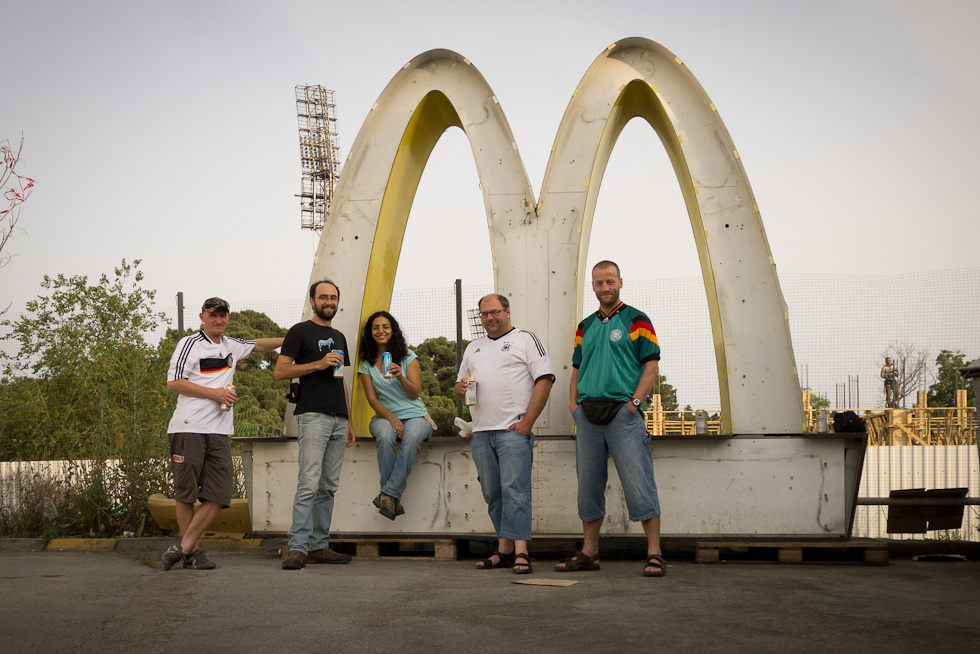
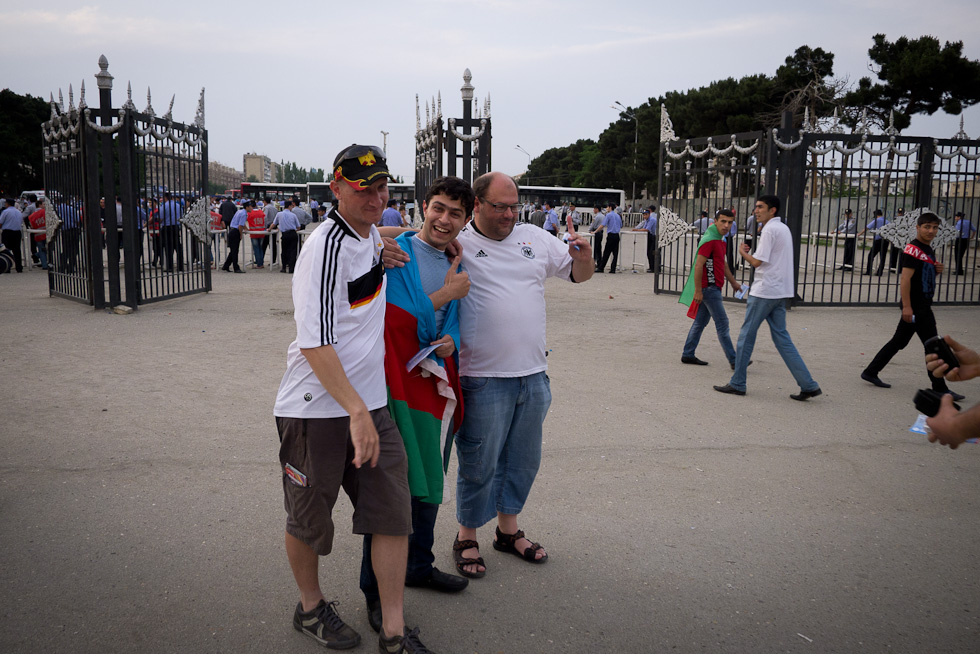
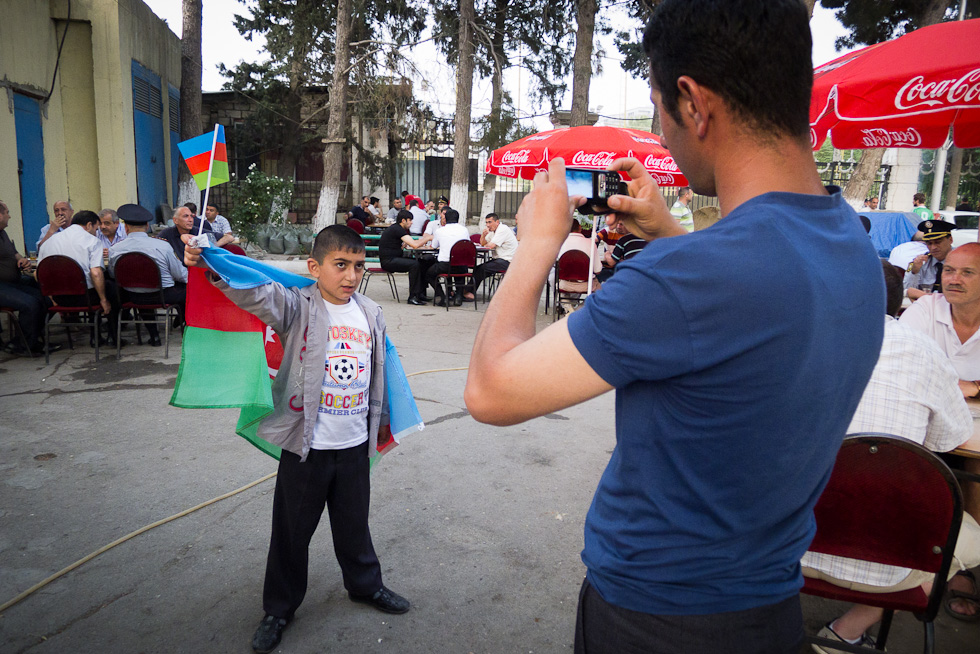
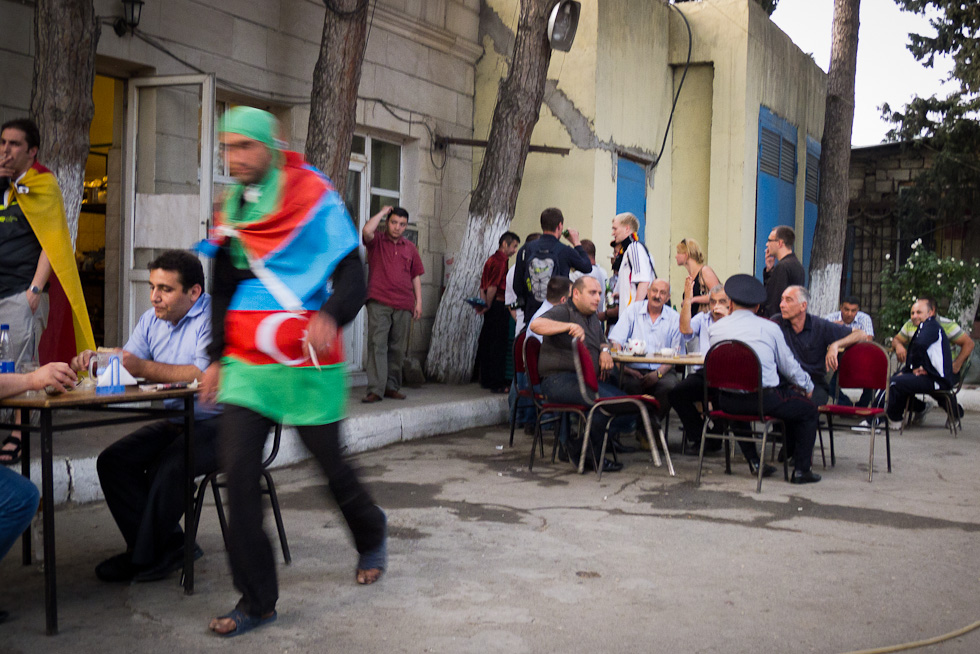
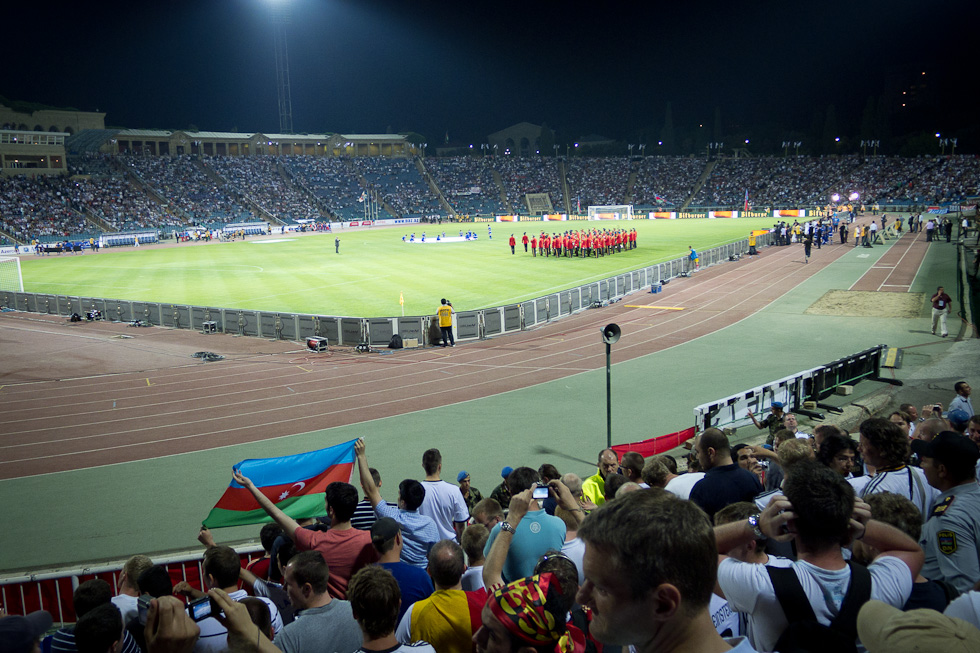
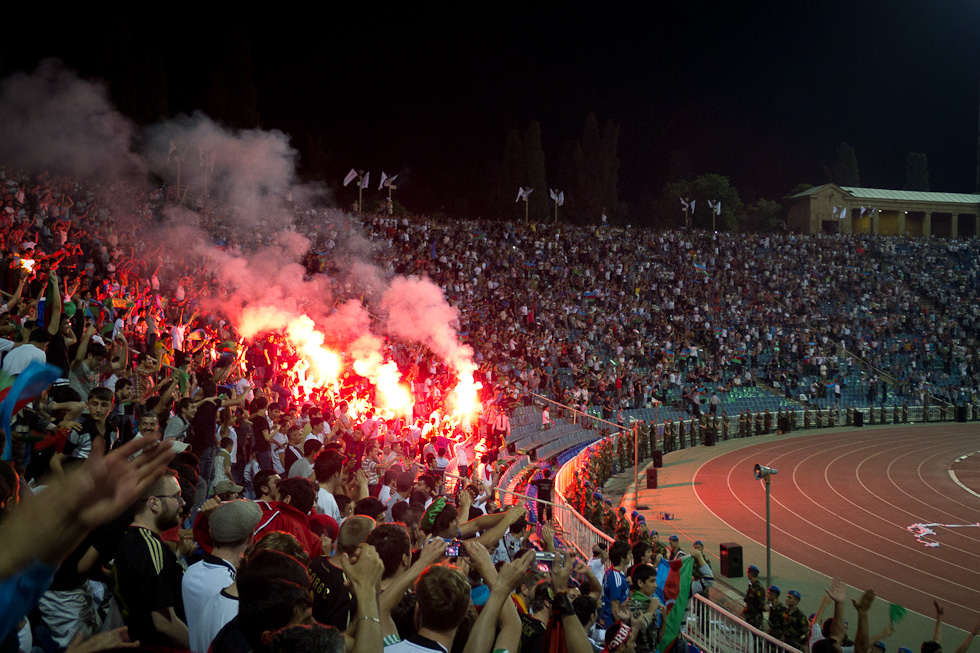
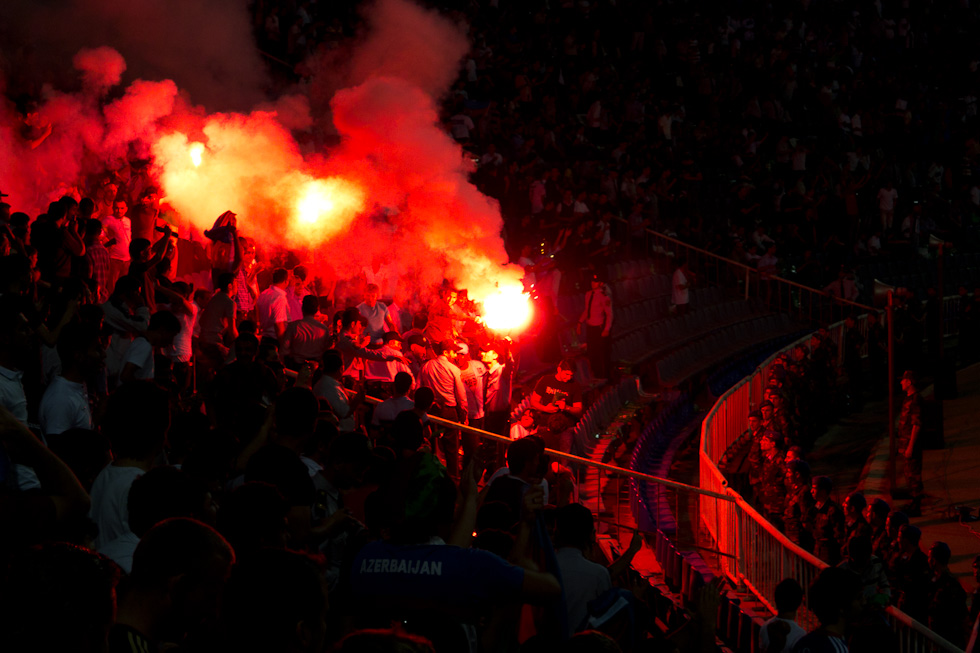
During our five days in Baku we didn’t do much of anything at all, since our main goal here was to get our onward travel visas and move on. There isn’t much to do in Baku anyway, so we spent our days cooking for ourselves and sometimes for our friends Matt and Paco, and the evenings drinking beer either in the hostel or in one of the expat bars in the center. Those bars are quite a phenomenon — lots of expats live in Baku, working in the various oil companies, and there’s a whole industry of Irish pubs to support them. On one of these evenings we met a pair of Israelis who work in the Israeli Embassy in Baku, and they claimed that they recognized our nationality by our boots. I seriously don’t know what’s Israeli about our boots, but so be it.
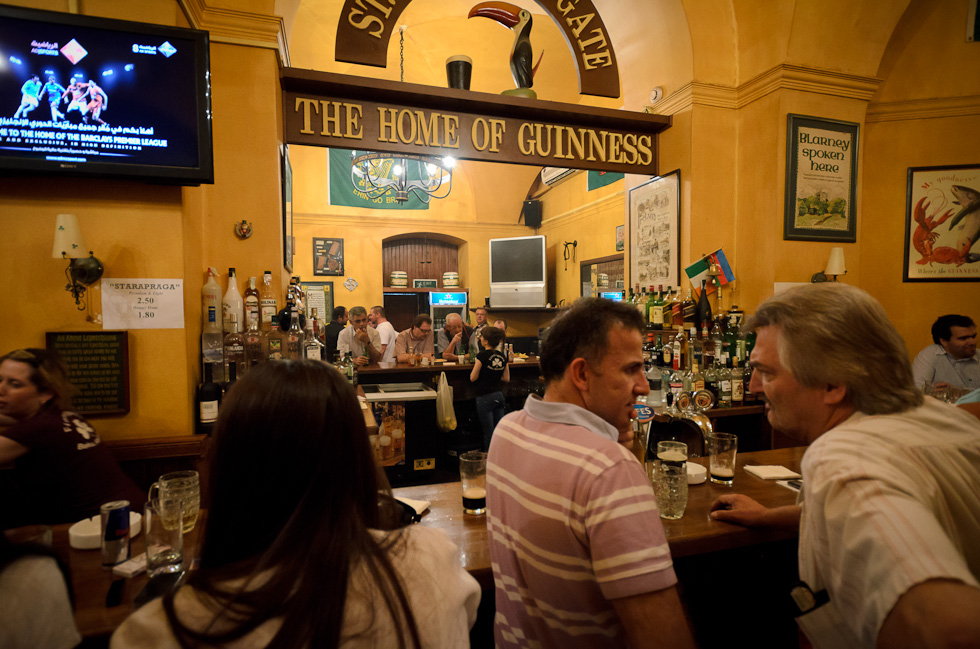
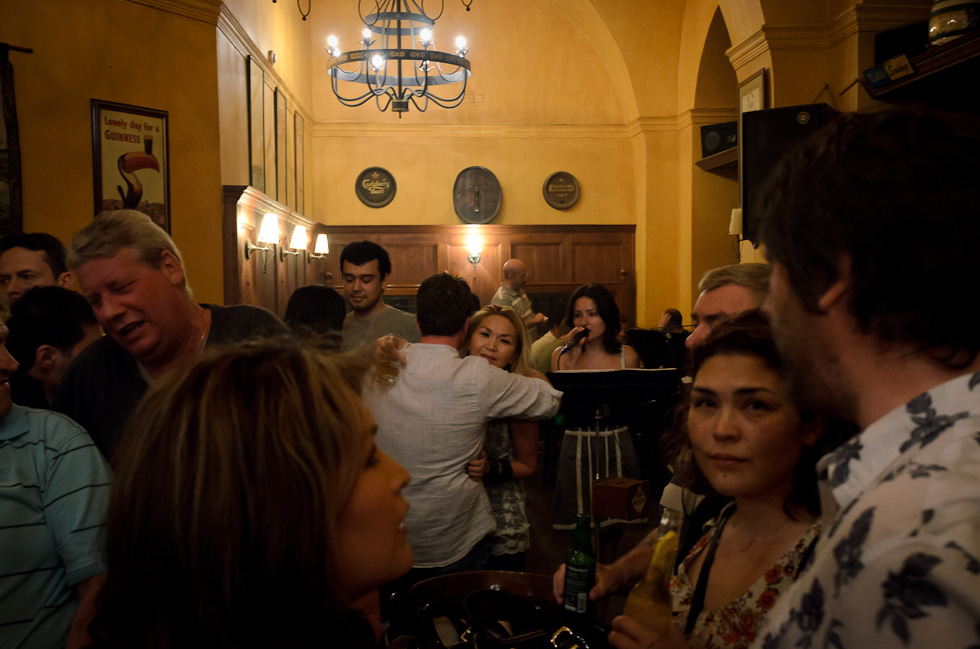
Our planned route, a ferry to Turkmenistan followed by a quick transit to Uzbekistan, cannot be followed because Turkmenistan doesn’t like issuing visas. But we got a Kazakhstan visa quite quickly instead. The Uzbekistan one is a bit more problematic, because an invitation letter has to be issued and then processed by the Ministry of Foreign Affairs. It’s quite unbelievable that they have to approve every incoming tourist, but this is Central Asia. That is not the end of it; there is a ferry across the Caspian every few days, but it’s a cargo ship that leaves when it’s full, and you never know about that until a few hours before departure. Our hostel owner’s brother, an unfortunate fellow who was shell-shocked in the Karabakh war with Armenia and now spends most of his time in the teahouse by the home drinking anything but tea, was the one making the calls for us. Unfortunately he doesn’t really understand what they answer on the phone, so I had to speak instead. Sometimes that wasn’t helpful enough either, and eventually Matt and Paco went to the port in person, and got on a boat an hour and a half later.
We decided to use our time while waiting for the wheels of bureaucracy to turn, and bought a night train ticket to Sheki. On the way to the train, as we were walking with our backpacks, a group of tourists stopped us. They were parents, a daughter and her husband, the latter two living for two years in Azerbaijan, and the parents visiting them. Not only were they Israeli, they were originally from our neighborhood in Tel Aviv, about a block away from our house. That was quite incredible. They gave us many tips, and their email addresses, so hopefully our time in Azerbaijan will be a little more interesting from now on.
The train ride to Sheki was interesting too — we got a little taste of how things work in this region when the provodnitsa, via a translator, explained to us that we could reserve the whole compartment for ourselves if we gave her ten manat, and that perhaps we would be somewhat less happy otherwise. We settled on five. After that she became very friendly, and before bedtime brought us two glasses of tea and some candies. I naively thought that she was just being nice, but was wrong of course, since she asked for money for it, which we refused to pay. She threatened to bring in more people into the compartment; when I reminded her of the five manat, she smiled and said she didn’t know what I was talking about. I spent the night alternately sleeping and devising various devilish ways to get back at her, but she didn’t follow trough on her threat and we were left alone for the rest of the journey.
June 9, 2011